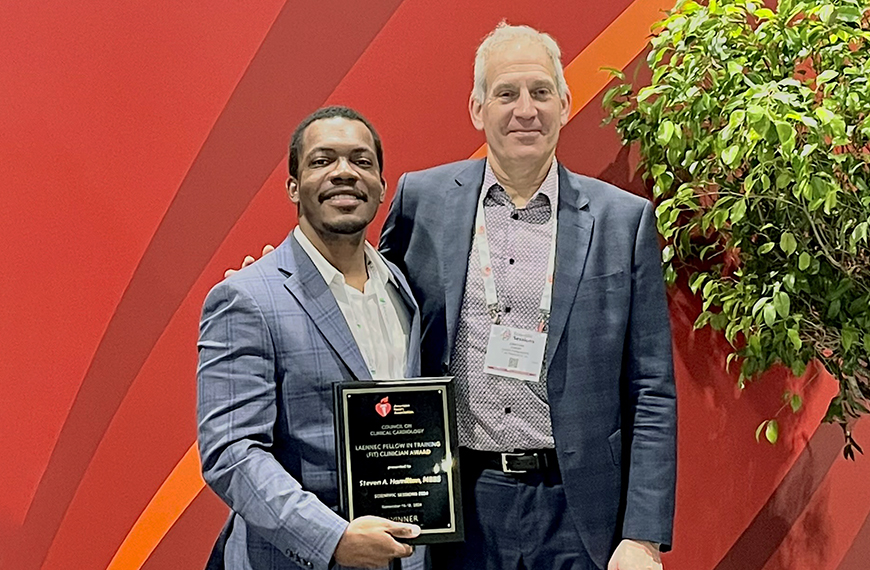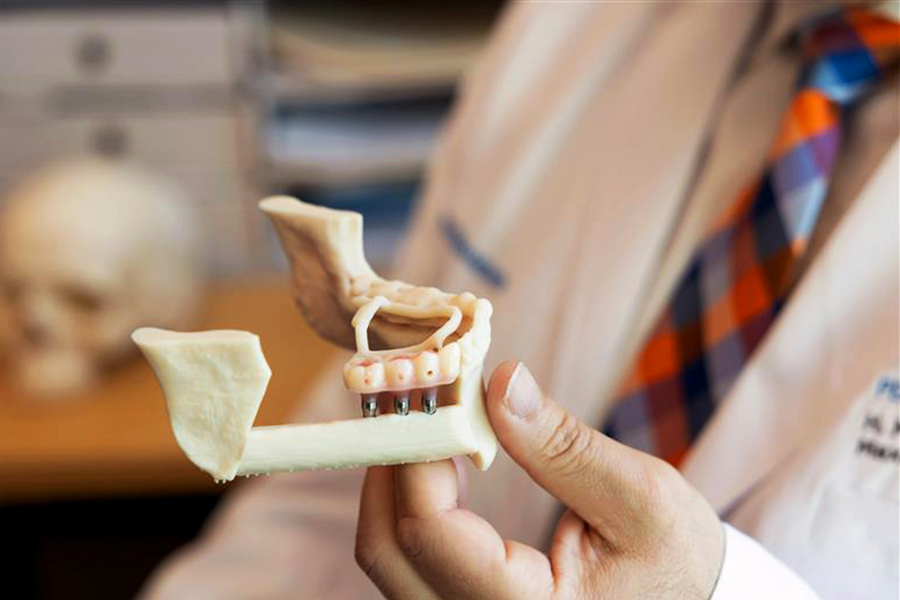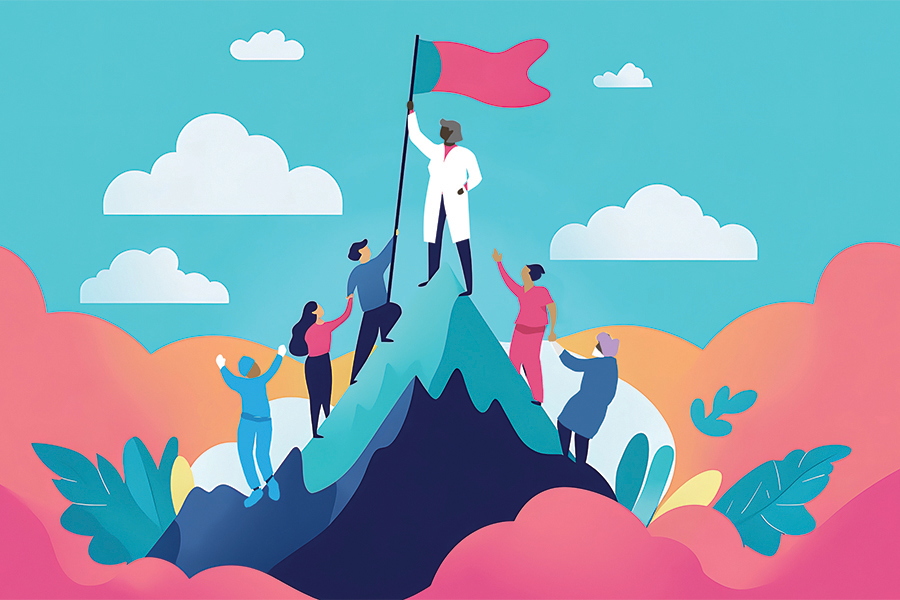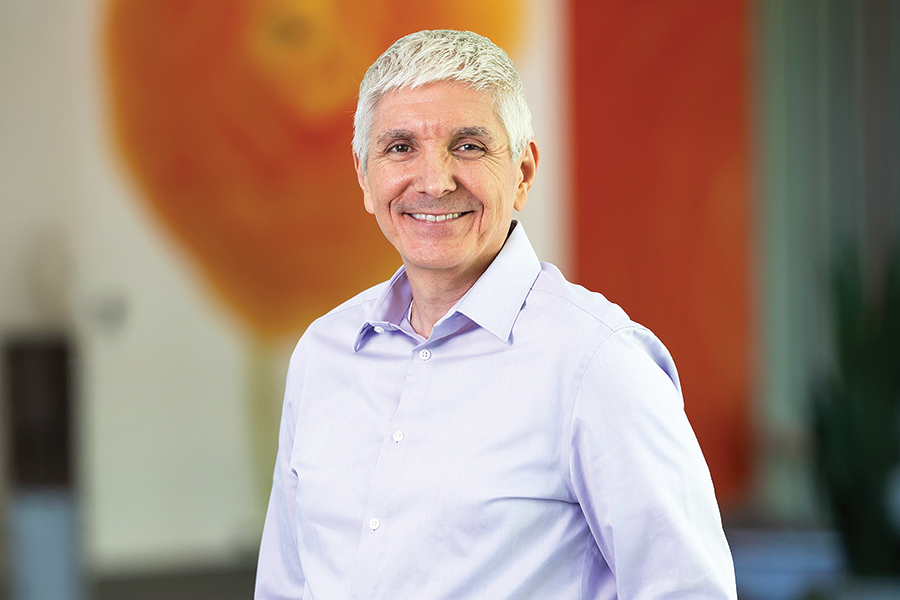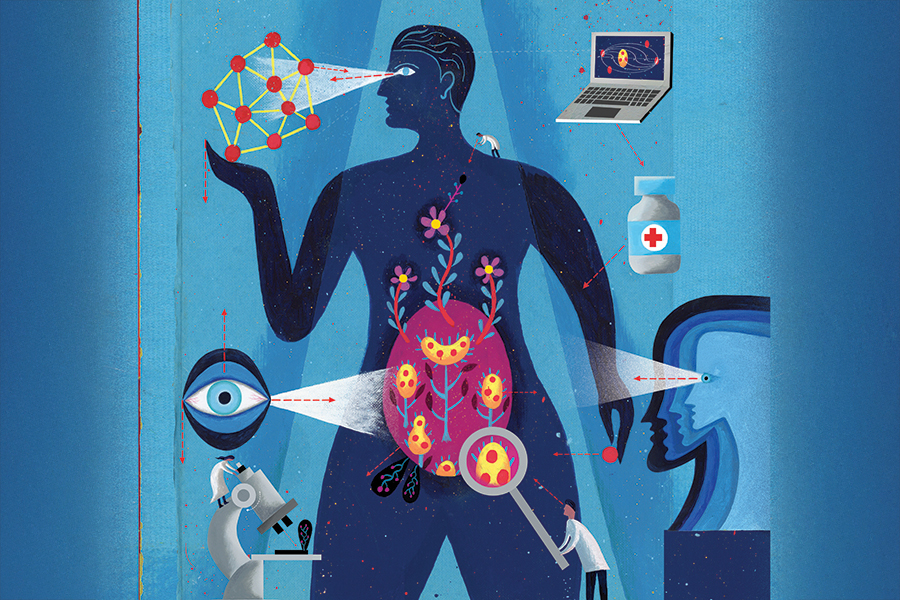Pictured above: Award winner Dr. Steven Hamilton (left) with Dr. Johnathan Zaroff, Cardiovascular Disease Fellowship program director and cardiologist with The Permanente Medical Group.
by Sue Rochman
December 19, 2024
As a medical student at the University of the West Indies in Mona, Jamaica, Steven Hamilton, MBBS, knew he would have to leave his home country to obtain the training necessary to reach his professional goal: to become a cardiologist specializing in heart failure, mechanical circulatory support, and heart transplantation.
The first step was entering a residency program, which Dr. Hamilton completed in the U.S. at Jersey Shore University Medical Center in New Jersey. There, he built on the strong foundational training he obtained during medical school. Impressed by his clinical skills, diagnostic reasoning, and research interests, his residency mentors encouraged him to consider a cardiovascular disease fellowship at Kaiser Permanente San Francisco. At the time, Dr. Hamilton knew very little about Kaiser Permanente or what it was like to be a physician with The Permanente Medical Group (TPMG). He also had never been to the West Coast.
“I took a leap of faith,” he says, “and I applied.”
His leap of faith turned to hope after he spoke with Cardiovascular Disease Fellowship Program Director Jonathan Zaroff, MD, who explained the unique opportunities available to him in Kaiser Permanente Northern California.
“After that conversation, I knew I wanted to come to San Francisco,” Dr. Hamilton says. “I ranked the Kaiser Permanente fellowship first — and it worked out well.”
This past November, the American Heart Association honored Dr. Hamilton with the Laennec Fellow in Training Clinician Award — the highest national award a cardiology fellow can receive — at its annual meeting. Dr. Hamilton is the first Kaiser Permanente cardiology fellow to receive this honor, which recognizes research and analytic skills, teaching ability, and clinical acumen in an individual planning to be a future academic cardiologist. (Read “A Prestigious Competition” at the bottom of this page to learn about the case study Dr. Hamilton submitted to the Laennec award competition.)
“This award doesn’t recognize only me,” says Dr. Hamilton. “It’s also a tribute to my amazing mentors and the tremendous opportunities I have had throughout my fellowship.”
A unique framework
Every year, more than 600 physicians vie for one of the three available spots in the Kaiser Permanente (KP) Northern California Cardiovascular Disease Fellowship program, which provides university-caliber research opportunities within a community-based clinical training program. The cardiology fellowship is one of KP Northern California’s 15 fellowship and 21 residency programs that are helping train the next generation of physicians.
The program’s faculty is comprised of TPMG cardiologists and research scientists from the KP Northern California Division of Research (DOR). They say the strong research component sets Kaiser Permanente apart from other community-based fellowships, while the opportunity to gain skills and experience treating a large volume of patients with a wide range of medical conditions differentiates it from many university-based fellowships.
“KP San Francisco is one of our three centers of excellence for cardiology, which means that we have concentrated physician expertise and patient referrals from across the region,” says Ted O’Connell, MD, KP Northern California director of medical education and a TPMG family medicine physician at KP Vallejo. “Our cardiologists see many rare cases that the cardiology fellows can learn from and potentially turn into scholarly work. Our fellows also have experiences and opportunities that may not be available elsewhere.”
This includes performing advanced procedures, such as pericardiocentesis — which was featured in Dr. Hamilton’s case study.
“Pericardiocentesis is a lifesaving procedure in which a needle is inserted into the sac around the heart, called the pericardium, to remove excess fluid,” says Dr. Zaroff. “In a traditional academic setting, only a subspecialty fellow in interventional cardiology would get to conduct these procedures. Here, general cardiology fellows like Dr. Hamilton are trained by our interventional cardiologists in how to perform them. They are gaining advanced skills they might not learn in traditional academic settings.”
A strong research component
Over the past six years, the research component of the cardiology fellowship has expanded under Associate Program Director for Research Andrew Ambrosy, MD, who is a TPMG cardiologist and DOR research scientist. Dr. Ambrosy has overseen the expansion of the cardiology research conducted at KP San Francisco.
“All our fellows now get intimately involved in conducting research, and they have opportunities not typically available in a community-based fellowship program,” says Dr. Ambrosy. “Over the past five years, our fellows have been co-authors on 50 papers, ranging from original scientific manuscripts and invited editorials to state-of-the-art reviews.”
The research mentors, who are TPMG physicians and research scientists affiliated with DOR’s Cardiovascular and Metabolic Conditions Research section, provide an unrivaled depth of experience in conducting research embedded within a fully integrated and learning health care delivery system.
“Our fellows are provided with the time to do research, and we are able to help them design a project they can complete during their time here,” says Alan Go, MD, associate director at the Division of Research overseeing the Cardiovascular and Metabolic Conditions Research section. “For fellows, having a high-quality academic product is critical for the next step of their career. Physicians who come into our fellowship program know that we have proven success in that area and a team that will mentor them from idea generation through publication.”
For Dr. Hamilton, who served this year as chief fellow, the next step will be a one-year advanced training fellowship in heart failure, mechanical circulatory support, and heart transplantation at the Cleveland Clinic, for which he could not be better prepared.
“My TPMG and Division of Research mentors have poured so much into me, and I’ve made it a point to make the most of every opportunity available,” says Dr. Hamilton. “Their support has benefitted me greatly, and it will help me to continue providing highly skilled care to all my patients going forward.”


